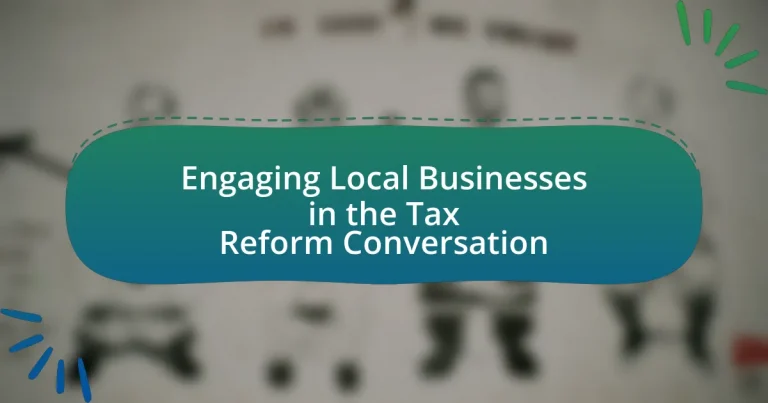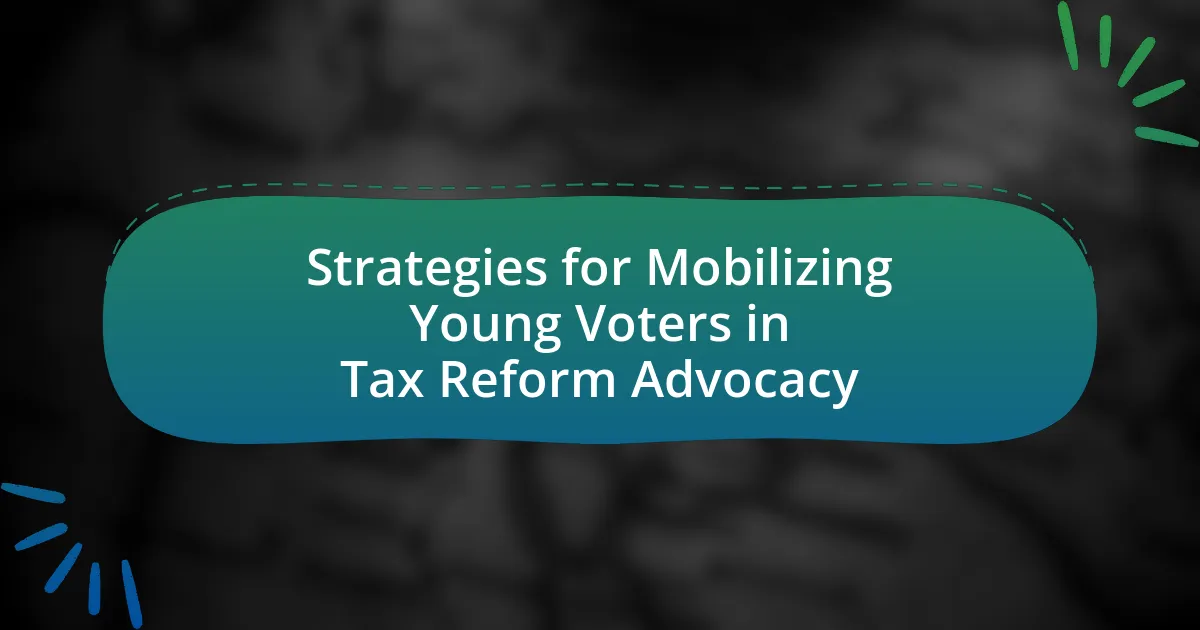Engaging local businesses in the tax reform conversation involves their active participation in discussions and decision-making processes regarding tax policies that impact their operations. This engagement is crucial as it allows businesses to voice concerns, share insights, and influence policies that can drive economic growth and sustainability within their communities. The article explores the importance of local business involvement, the challenges they face, and the strategies they can employ to effectively participate in tax reform discussions. It also highlights the role of local economies in shaping tax policies and the potential outcomes of increased business engagement in these conversations.
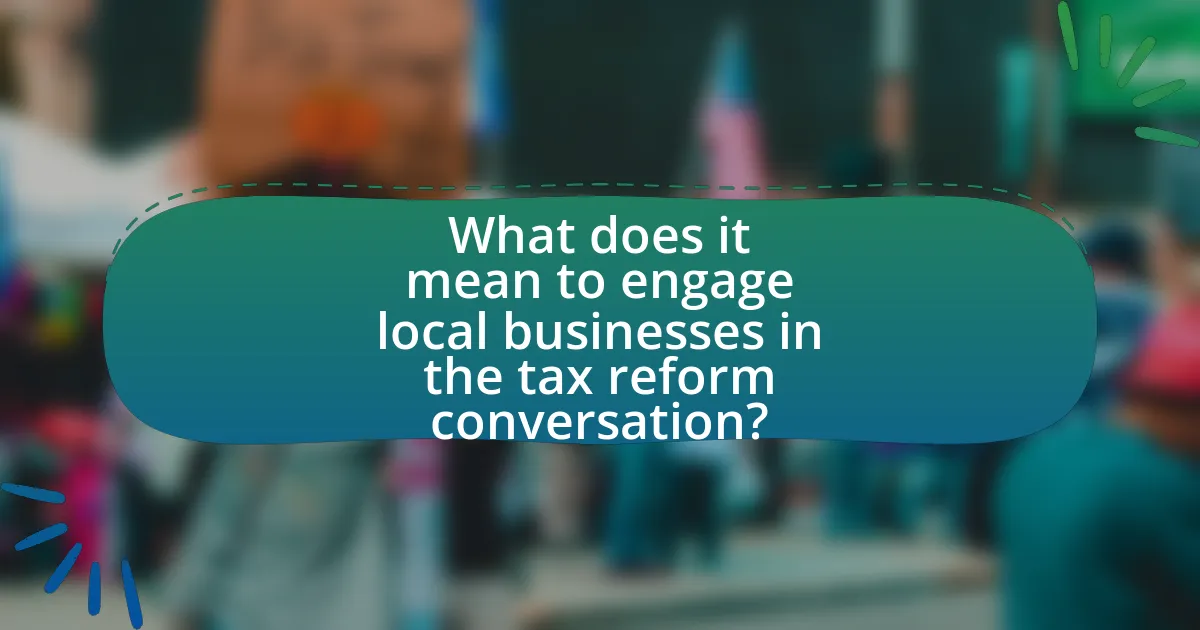
What does it mean to engage local businesses in the tax reform conversation?
Engaging local businesses in the tax reform conversation means actively involving them in discussions and decision-making processes regarding changes to tax policies that affect their operations. This engagement allows local businesses to voice their concerns, share insights on the potential impacts of tax reforms, and contribute to shaping policies that can foster economic growth and sustainability in their communities. Research indicates that when local businesses participate in tax reform discussions, it can lead to more informed and effective policy outcomes, as their unique perspectives often highlight the practical implications of proposed changes.
Why is it important to involve local businesses in tax reform discussions?
Involving local businesses in tax reform discussions is crucial because they provide valuable insights into the economic impact of tax policies. Local businesses are directly affected by tax changes, influencing their operational costs, investment decisions, and employment levels. Their participation ensures that tax reforms are practical and consider the realities of the local economy. For instance, a study by the National Federation of Independent Business found that 70% of small business owners believe tax policy significantly affects their business decisions. Engaging these stakeholders leads to more informed and effective tax policies that can stimulate local economic growth.
How can local businesses influence tax policy decisions?
Local businesses can influence tax policy decisions through advocacy, lobbying, and participation in public forums. By organizing and presenting their collective interests, local businesses can effectively communicate their needs and concerns to policymakers. For instance, the National Federation of Independent Business (NFIB) reports that small business owners who engage with legislators can shape tax policies that directly affect their operations, such as deductions and credits. Additionally, local businesses can collaborate with chambers of commerce to amplify their voices, ensuring that their perspectives are considered in tax reform discussions. This engagement can lead to more favorable tax policies that support local economic growth and sustainability.
What role do local economies play in tax reform?
Local economies significantly influence tax reform by shaping the revenue needs and priorities of municipalities. Local businesses contribute to tax bases, which directly affects funding for public services and infrastructure. For instance, in 2020, local governments in the United States derived approximately 48% of their revenue from property taxes, highlighting the importance of local economic activity in determining tax structures. Additionally, local economies can advocate for tax reforms that support small businesses, which are vital for job creation and economic growth. This engagement ensures that tax policies reflect the unique needs and challenges of local communities, ultimately leading to more effective and equitable tax systems.
What challenges do local businesses face in tax reform conversations?
Local businesses face several challenges in tax reform conversations, primarily including a lack of representation, limited resources for advocacy, and the complexity of tax regulations. These businesses often struggle to have their voices heard in discussions dominated by larger corporations and lobbyists, which can lead to policies that do not reflect their needs. Additionally, many local businesses lack the financial and human resources necessary to engage effectively in advocacy efforts, making it difficult for them to influence tax reform outcomes. The intricate nature of tax laws further complicates their ability to understand and respond to proposed changes, resulting in a disconnect between policymakers and the realities faced by these businesses.
How do differing business sizes impact engagement in tax reform?
Differing business sizes significantly impact engagement in tax reform, as larger businesses typically have more resources and influence to participate in the process compared to smaller businesses. Larger corporations often employ dedicated teams to navigate tax policies and advocate for their interests, resulting in a more structured approach to engagement. In contrast, smaller businesses may lack the same level of resources, leading to less participation and a reliance on broader industry associations to represent their interests. According to a 2021 survey by the National Federation of Independent Business, 70% of small business owners reported feeling uninformed about tax reform proposals, highlighting the disparity in engagement levels based on business size. This difference in engagement can lead to unequal representation in tax policy discussions, affecting the outcomes that ultimately impact all businesses.
What barriers exist for local businesses in participating in tax discussions?
Local businesses face several barriers in participating in tax discussions, primarily including lack of resources, limited knowledge, and fear of repercussions. Many small business owners lack the financial and human resources necessary to engage in complex tax discussions, which can limit their ability to contribute effectively. Additionally, a significant number of local business owners may not have adequate knowledge of tax policies or the implications of proposed reforms, making it challenging for them to participate meaningfully. Furthermore, there is often a fear of negative consequences, such as increased scrutiny from tax authorities or backlash from the community, which can deter local businesses from voicing their opinions in tax discussions. These barriers collectively hinder the engagement of local businesses in the tax reform conversation.
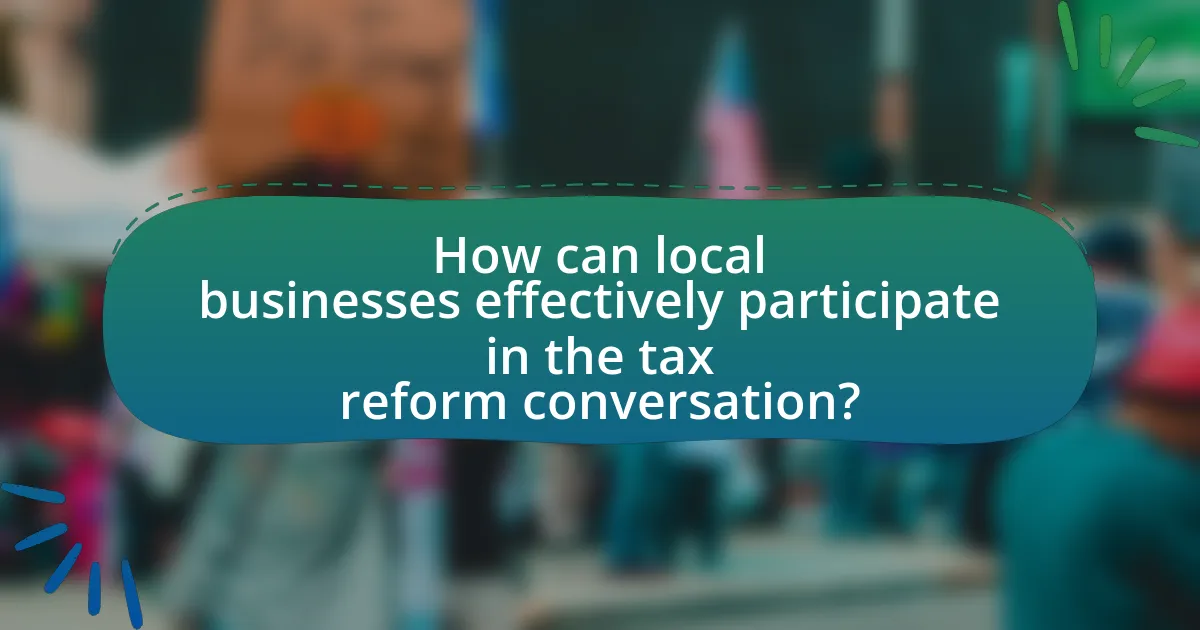
How can local businesses effectively participate in the tax reform conversation?
Local businesses can effectively participate in the tax reform conversation by actively engaging with policymakers and advocating for their interests. This can be achieved through organized efforts such as joining local chambers of commerce, which often provide a platform for collective advocacy, or participating in public forums and town hall meetings where tax reform discussions occur.
Additionally, local businesses should gather and present data on how proposed tax changes could impact their operations and the local economy. For instance, studies have shown that small businesses contribute significantly to job creation, and presenting this data can help illustrate the potential consequences of tax reforms on employment and economic growth. By leveraging their unique perspectives and experiences, local businesses can influence tax policy in a way that reflects their needs and the needs of their communities.
What strategies can local businesses use to engage in tax reform discussions?
Local businesses can engage in tax reform discussions by forming coalitions with other businesses to amplify their collective voice. This strategy allows them to present unified positions on tax issues, making it easier to influence policymakers. Additionally, local businesses can participate in public forums and town hall meetings to express their views directly to legislators and the community. Engaging with local chambers of commerce or business associations can also provide a platform for advocacy and collaboration on tax reform initiatives. Furthermore, businesses can utilize social media to raise awareness and mobilize support for specific tax reform proposals, thereby increasing public engagement and pressure on decision-makers.
How can businesses collaborate with local government on tax issues?
Businesses can collaborate with local government on tax issues by participating in advisory boards and public forums that discuss tax policies. This engagement allows businesses to provide input on tax regulations that affect their operations and to advocate for tax incentives that can stimulate local economic growth. For instance, cities like San Francisco have established business advisory councils that facilitate direct communication between local businesses and government officials, ensuring that the perspectives of the business community are considered in tax-related decisions. Such collaboration can lead to more favorable tax environments that benefit both local governments and businesses.
What communication methods are most effective for local businesses?
Effective communication methods for local businesses include social media engagement, email marketing, and community events. Social media platforms like Facebook and Instagram allow businesses to connect with local customers, share promotions, and receive feedback in real-time. Email marketing enables targeted communication, fostering customer loyalty through personalized offers and updates. Community events, such as local fairs or workshops, provide opportunities for face-to-face interaction, enhancing brand visibility and trust within the community. According to a survey by the Local Search Association, 70% of consumers prefer to engage with businesses through social media, highlighting its effectiveness as a communication method.
What resources are available to assist local businesses in tax reform engagement?
Local businesses can access various resources to assist in tax reform engagement, including local chambers of commerce, industry associations, and government websites. Chambers of commerce often provide advocacy tools, educational seminars, and networking opportunities that help businesses understand tax reform implications. Industry associations offer specialized resources, including research reports and policy briefs tailored to specific sectors, which can guide businesses in their engagement efforts. Additionally, government websites frequently publish information on tax reform proposals, public comment opportunities, and resources for businesses to voice their concerns or support. These resources collectively empower local businesses to actively participate in the tax reform conversation.
Which organizations provide support for local businesses in tax matters?
The Internal Revenue Service (IRS) provides support for local businesses in tax matters through resources such as tax guides, workshops, and online tools. Additionally, the Small Business Administration (SBA) offers assistance with tax-related issues, including access to tax information and resources tailored for small businesses. Local chambers of commerce also play a crucial role by providing networking opportunities and educational resources that help businesses navigate tax regulations. These organizations collectively enhance the understanding of tax obligations and compliance for local businesses.
How can local chambers of commerce facilitate tax reform discussions?
Local chambers of commerce can facilitate tax reform discussions by serving as a platform for dialogue between business leaders and policymakers. They can organize forums, workshops, and roundtable discussions that bring together stakeholders to share insights and concerns regarding tax policies. For instance, chambers can leverage their networks to gather data on how proposed tax reforms impact local businesses, thereby providing evidence-based feedback to legislators. Additionally, they can advocate for the interests of their members by presenting unified positions on tax issues, which can influence legislative outcomes. This approach not only fosters collaboration but also ensures that the voices of local businesses are heard in the tax reform process.
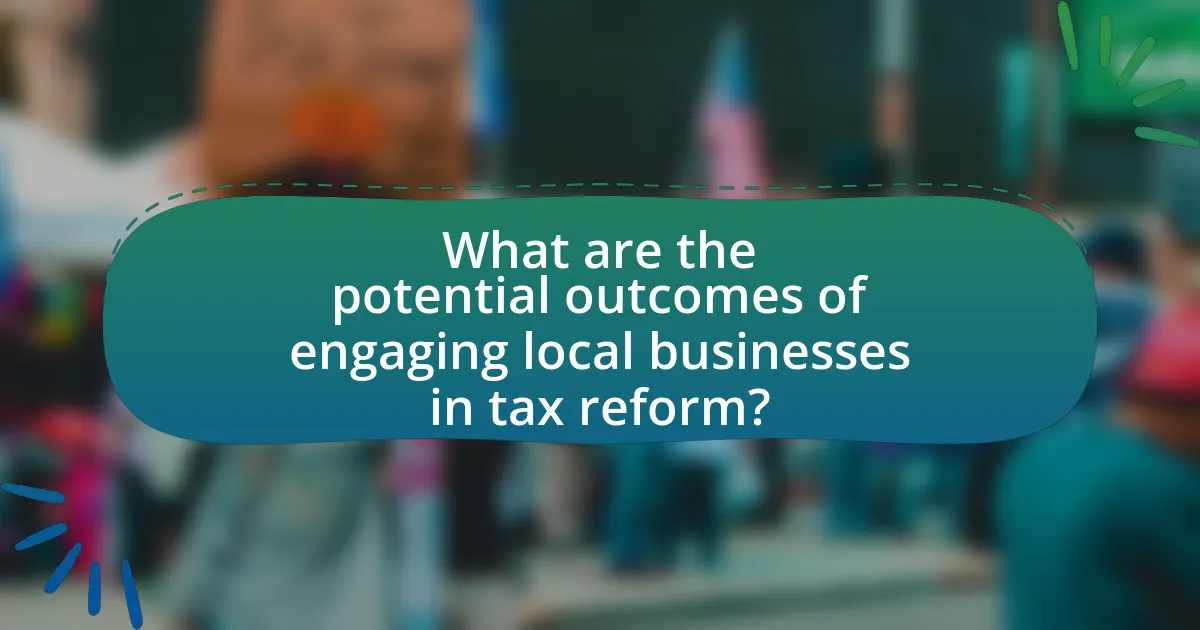
What are the potential outcomes of engaging local businesses in tax reform?
Engaging local businesses in tax reform can lead to enhanced economic growth and improved community relations. When local businesses participate in tax reform discussions, they can provide valuable insights that shape policies to better reflect the needs of the community, potentially resulting in tax structures that promote investment and job creation. For instance, a study by the National Federation of Independent Business found that small businesses that engage in policy discussions are more likely to experience growth, as their input can lead to tax incentives that directly benefit them. Additionally, involving local businesses fosters a sense of ownership and accountability, which can strengthen community ties and encourage collaborative efforts to address local economic challenges.
How can local businesses benefit from participating in tax reform conversations?
Local businesses can benefit from participating in tax reform conversations by influencing policies that directly affect their operations and financial health. Engaging in these discussions allows local businesses to voice their concerns and priorities, ensuring that tax reforms consider the unique challenges they face. For instance, studies have shown that businesses involved in advocacy efforts can lead to more favorable tax policies, which can result in lower tax burdens and increased investment opportunities. Additionally, participation fosters relationships with policymakers, enhancing local businesses’ ability to navigate regulatory changes effectively.
What positive changes can arise from local business involvement in tax policy?
Local business involvement in tax policy can lead to enhanced economic growth and community development. When local businesses participate in tax discussions, they can advocate for policies that support their operations, which can result in job creation and increased local investment. For instance, a study by the National Federation of Independent Business found that small businesses that engage in policy advocacy are more likely to experience revenue growth, which contributes to overall economic stability in their communities. Additionally, local businesses can provide valuable insights into the unique needs of their communities, leading to more tailored and effective tax policies that promote equitable growth.
How does engagement lead to better representation of local interests?
Engagement leads to better representation of local interests by fostering direct communication between community members and decision-makers. This interaction allows local businesses to voice their specific needs and concerns, ensuring that policies reflect the unique characteristics of the community. For instance, studies show that when local stakeholders participate in policy discussions, the resulting regulations are more likely to address local economic conditions and priorities, as evidenced by the success of community-driven initiatives in various regions. Such engagement not only enhances transparency but also builds trust, leading to more effective and tailored solutions that resonate with the local populace.
What are the best practices for local businesses in tax reform advocacy?
Local businesses should actively engage in tax reform advocacy by forming coalitions, communicating with policymakers, and educating their communities about the impacts of tax policies. Forming coalitions allows businesses to amplify their voices and present a united front, which can be more persuasive to lawmakers. Effective communication with policymakers involves sharing specific data and personal stories that illustrate how tax reforms affect local economies and job creation. Additionally, educating the community through workshops or informational campaigns helps raise awareness and mobilizes public support for favorable tax policies. These practices are supported by studies showing that organized advocacy efforts can lead to more favorable legislative outcomes for local businesses.
How can businesses effectively communicate their needs to policymakers?
Businesses can effectively communicate their needs to policymakers by utilizing clear, data-driven messaging and establishing ongoing relationships with decision-makers. By presenting well-researched proposals that outline specific needs and potential impacts, businesses can demonstrate the importance of their requests. For instance, a study by the National Federation of Independent Business found that 70% of small business owners believe that government regulations significantly affect their operations, highlighting the necessity for policymakers to understand business perspectives. Engaging in regular dialogue through forums, meetings, and written communications further ensures that businesses remain visible and influential in the policymaking process.
What common mistakes should local businesses avoid in tax reform discussions?
Local businesses should avoid the mistake of not being informed about the specifics of tax reform proposals. Engaging in discussions without a clear understanding of how changes will impact their operations can lead to ineffective advocacy or opposition. Additionally, failing to collaborate with industry associations or local chambers of commerce can result in missed opportunities for collective bargaining and influence. Research indicates that businesses that actively participate in organized groups are more successful in shaping favorable tax policies. Lastly, neglecting to communicate their unique needs and challenges to policymakers can lead to reforms that do not consider the local economic landscape, ultimately harming their competitiveness.
What practical steps can local businesses take to engage in the tax reform conversation?
Local businesses can engage in the tax reform conversation by actively participating in community forums and discussions with policymakers. By attending town hall meetings, local chambers of commerce events, and public hearings, businesses can voice their concerns and suggestions regarding tax policies. Additionally, forming coalitions with other local businesses can amplify their influence, allowing them to present a united front on tax reform issues. Research shows that businesses that engage in advocacy efforts can significantly impact legislative outcomes, as evidenced by the National Federation of Independent Business, which reports that small business advocacy has led to favorable tax reforms in various states.
